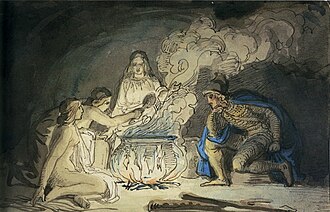3 revisions
#33 months ago
+6-5
Migrated from pages table
-[Honko](https://en.wikipedia.org/wiki/Lauri_Honko) asserted that, in some cases, a society reenacts a myth in an attempt to reproduce the conditions of the mythical age. For example, it might reenact the healing performed by a god at the beginning of time in order to heal someone in the present.[\[37\]](https://en.wikipedia.org/wiki/Myth#cite_note-FOOTNOTEHonko198441%E2%80%9342,_49-37) Similarly, [Barthes](https://en.wikipedia.org/wiki/Roland_Barthes) argued that modern culture explores religious experience. Since it is not the job of science to define human morality, a religious experience is an attempt to connect with a perceived moral past, which is in contrast with the technological present.[\[77\]](https://en.wikipedia.org/wiki/Myth#cite_note-FOOTNOTEBarthes1972[[Category:Wikipedia_articles_needing_page_number_citations_from_August_2021]]%3Csup_class=%22noprint_Inline-Template_%22_style=%22white-space:nowrap;%22%3E[%3Ci%3E[[Wikipedia:Citing_sources|%3Cspan_title=%22This_citation_requires_a_reference_to_the_specific_page_or_range_of_pages_in_which_the_material_appears. \(August_2021\)%22%3Epage needed%3C/span%3E]]%3C/i%3E]%3C/sup%3E-77)
-In the 1950s, [Barthes](https://en.wikipedia.org/wiki/Roland_Barthes) published a series of essays examining modern myths and the process of their creation in his book [*Mythologies*](https://en.wikipedia.org/wiki/Mythologies_\(book\)), which stood as an early work in the emerging [post-structuralist](https://en.wikipedia.org/wiki/Post-structuralism) approach to mythology, which recognised myths' existence in the modern world and in [popular culture](https://en.wikipedia.org/wiki/Popular_culture).[\[77\]](https://en.wikipedia.org/wiki/Myth#cite_note-FOOTNOTEBarthes1972[[Category:Wikipedia_articles_needing_page_number_citations_from_August_2021]]%3Csup_class=%22noprint_Inline-Template_%22_style=%22white-space:nowrap;%22%3E[%3Ci%3E[[Wikipedia:Citing_sources|%3Cspan_title=%22This_citation_requires_a_reference_to_the_specific_page_or_range_of_pages_in_which_the_material_appears. \(August_2021\)%22%3Epage needed%3C/span%3E]]%3C/i%3E]%3C/sup%3E-77)
- 72. See also: [Mythopoeia (poem)](https://en.wikipedia.org/wiki/Mythopoeia_\(poem\)); [cf.](https://en.wikipedia.org/wiki/Cf.) Tolkien, J. R. R. \[1964\] 2001. [*Tree and Leaf; Mythopoeia; The Homecoming of Beorhtnoth Beorhthelm's Son*](https://books.google.com/books?id=JW-cQ-cypwwC) *[Archived](https://web.archive.org/web/20221211183157/https://books.google.co.uk/books?id=JW-cQ-cypwwC) 11 December 2022 at the [Wayback Machine](https://en.wikipedia.org/wiki/Wayback_Machine).* London: [HarperCollins](https://en.wikipedia.org/wiki/HarperCollins). [ISBN](https://en.wikipedia.org/wiki/ISBN_\(identifier\)) [978-0-00-710504-5](https://en.wikipedia.org/wiki/Special:BookSources/978-0-00-710504-5).
-- ["](https://mythology.net/)[Mythology.net](http://Mythology.net)["](https://mythology.net/).
- 
+
+
+[Honko](https://en.wikipedia.org/wiki/Lauri_Honko) asserted that, in some cases, a society reenacts a myth in an attempt to reproduce the conditions of the mythical age. For example, it might reenact the healing performed by a god at the beginning of time in order to heal someone in the present.[\[37\]](https://en.wikipedia.org/wiki/Myth#cite_note-FOOTNOTEHonko198441%E2%80%9342,_49-37) Similarly, [Barthes](https://en.wikipedia.org/wiki/Roland_Barthes) argued that modern culture explores religious experience. Since it is not the job of science to define human morality, a religious experience is an attempt to connect with a perceived moral past, which is in contrast with the technological present.[\[77\]](https://en.wikipedia.org/wiki/Myth#cite_note-FOOTNOTEBarthes1972%5B%5BCategory:Wikipedia_articles_needing_page_number_citations_from_August_2021%5D%5D%3Csup_class=%22noprint_Inline-Template_%22_style=%22white-space:nowrap;%22%3E%5B%3Ci%3E%5B%5BWikipedia:Citing_sources%7C%3Cspan_title=%22This_citation_requires_a_reference_to_the_specific_page_or_range_of_pages_in_which_the_material_appears.%20\(August_2021\)%22%3Epage%C2%A0needed%3C/span%3E%5D%5D%3C/i%3E%5D%3C/sup%3E-77)
+In the 1950s, [Barthes](https://en.wikipedia.org/wiki/Roland_Barthes) published a series of essays examining modern myths and the process of their creation in his book [*Mythologies*](https://en.wikipedia.org/wiki/Mythologies_\(book\)), which stood as an early work in the emerging [post-structuralist](https://en.wikipedia.org/wiki/Post-structuralism) approach to mythology, which recognised myths' existence in the modern world and in [popular culture](https://en.wikipedia.org/wiki/Popular_culture).[\[77\]](https://en.wikipedia.org/wiki/Myth#cite_note-FOOTNOTEBarthes1972%5B%5BCategory:Wikipedia_articles_needing_page_number_citations_from_August_2021%5D%5D%3Csup_class=%22noprint_Inline-Template_%22_style=%22white-space:nowrap;%22%3E%5B%3Ci%3E%5B%5BWikipedia:Citing_sources%7C%3Cspan_title=%22This_citation_requires_a_reference_to_the_specific_page_or_range_of_pages_in_which_the_material_appears.%20\(August_2021\)%22%3Epage%C2%A0needed%3C/span%3E%5D%5D%3C/i%3E%5D%3C/sup%3E-77)
+ 72. See also: [Mythopoeia (poem)](https://en.wikipedia.org/wiki/Mythopoeia_\(poem\)); [cf.](https://en.wikipedia.org/wiki/Cf.) Tolkien, J. R. R. \[1964\] 2001. [*Tree and Leaf; Mythopoeia; The Homecoming of Beorhtnoth Beorhthelm's Son*](https://books.google.com/books?id=JW-cQ-cypwwC) [*Archived*](https://web.archive.org/web/20221211183157/https://books.google.co.uk/books?id=JW-cQ-cypwwC) *11 December 2022 at the [Wayback Machine](https://en.wikipedia.org/wiki/Wayback_Machine).* London: [HarperCollins](https://en.wikipedia.org/wiki/HarperCollins). [ISBN](https://en.wikipedia.org/wiki/ISBN_\(identifier\)) [978-0-00-710504-5](https://en.wikipedia.org/wiki/Special:BookSources/978-0-00-710504-5).
... 6 more lines
+301-6
-A **myth** is a traditional, often sacred, narrative that explains natural phenomena, human origins, or cultural practices. These powerful stories, frequently involving [Deities](/wiki/deities) or [Heroes](/wiki/heroes), shape a society's understanding of itself and the universe.
-## See also
-- [Folklore](/wiki/folklore)
-- [Religion](/wiki/religion)
-- [Symbolism](/wiki/symbolism)
+**Myth** is a [genre](https://en.wikipedia.org/wiki/Genre) of [folklore](https://en.wikipedia.org/wiki/Folklore) consisting primarily of [narratives](https://en.wikipedia.org/wiki/Narrative) that play a fundamental role in a society. For scholars, this is totally different from the ordinary sense of the term *myth*, meaning a [belief](https://en.wikipedia.org/wiki/Belief) that is not true, as the veracity of a piece of folklore is entirely irrelevant to determining whether it constitutes a myth.[\[1\]](https://en.wikipedia.org/wiki/Myth#cite_note-1)
+Myths are often endorsed by religious and secular authorities, and may be natural or supernatural in character.[\[2\]](https://en.wikipedia.org/wiki/Myth#cite_note-FOOTNOTEBascom19659-2) Many societies group their myths, [legends](https://en.wikipedia.org/wiki/Legend), and history together, considering myths and legends to be factual accounts of their remote past.[\[6\]](https://en.wikipedia.org/wiki/Myth#cite_note-6) In particular, [creation myths](https://en.wikipedia.org/wiki/Creation_myth) take place in a primordial age when the world had not achieved its later form.[\[10\]](https://en.wikipedia.org/wiki/Myth#cite_note-10) [Origin myths](https://en.wikipedia.org/wiki/Origin_myth) explain how a society's [customs](https://en.wikipedia.org/wiki/Norm_\(social\)), [institutions](https://en.wikipedia.org/wiki/Institutions), and [taboos](https://en.wikipedia.org/wiki/Taboos) were established and sanctified.[\[2\]](https://en.wikipedia.org/wiki/Myth#cite_note-FOOTNOTEBascom19659-2)[\[8\]](https://en.wikipedia.org/wiki/Myth#cite_note-FOOTNOTEEliade19986-8) [National myths](https://en.wikipedia.org/wiki/National_myth) are narratives about a nation's past that symbolize the nation's values. There is a complex relationship between [recital of myths and the enactment of rituals](https://en.wikipedia.org/wiki/Myth_and_ritual).
+## Etymology
+The word *myth* comes from [Ancient Greek](https://en.wikipedia.org/wiki/Ancient_Greek) μῦθος (*mȳthos*),[\[11\]](https://en.wikipedia.org/wiki/Myth#cite_note-11) meaning 'speech', 'narrative', or 'fiction'. In turn, Ancient Greek μυθολογία (*mythología* 'story', 'legends', or 'story-telling') combines the word *mȳthos* with the suffix -λογία (*-logia* 'study').[\[12\]](https://en.wikipedia.org/wiki/Myth#cite_note-oedlogy-12) Accordingly, [Plato](https://en.wikipedia.org/wiki/Plato) used *mythología* as a general term for fiction or story-telling of any kind. This word began was adapted into other European languages in the early 19th century, in a much narrower sense, as a scholarly term for "\[a\] traditional story, especially one concerning the early history of a people or explaining a natural or social phenomenon, and typically involving supernatural beings or events."[\[13\]](https://en.wikipedia.org/wiki/Myth#cite_note-:0-13)[\[14\]](https://en.wikipedia.org/wiki/Myth#cite_note-oedmthos-14)
+The Greek term *mythología* was then borrowed into [Late Latin](https://en.wikipedia.org/wiki/Late_Latin), occurring in the title of Latin author [Fabius Planciades Fulgentius](https://en.wikipedia.org/wiki/Fabius_Planciades_Fulgentius)' 5th-century *Mythologiæ* to denote what is now referred to as [*classical mythology*](https://en.wikipedia.org/wiki/Classical_mythology)—i.e., Greco-Roman [etiological](https://en.wikipedia.org/wiki/Etiological) stories involving their gods. Fulgentius's *Mythologiæ* explicitly treated its subject matter as [allegories](https://en.wikipedia.org/wiki/Allegories) requiring interpretation and not as true events.[\[15\]](https://en.wikipedia.org/wiki/Myth#cite_note-15) The Latin term was then adopted in [Middle French](https://en.wikipedia.org/wiki/Middle_French) as *mythologie*. Whether from French or Latin usage, English adopted the word *mythology* in the 15th century, initially meaning 'the exposition of a myth or myths', 'the interpretation of fables', or 'a book of such expositions'. The word is first attested in [John Lydgate](https://en.wikipedia.org/wiki/John_Lydgate)'s [*Troy Book*](https://en.wikipedia.org/wiki/Troy_Book) (<u>c.</u> 1425).[\[16\]](https://en.wikipedia.org/wiki/Myth#cite_note-oedmlogy-16)[\[18\]](https://en.wikipedia.org/wiki/Myth#cite_note-18)[\[19\]](https://en.wikipedia.org/wiki/Myth#cite_note-19)
... 302 more lines
+6
+A **myth** is a traditional, often sacred, narrative that explains natural phenomena, human origins, or cultural practices. These powerful stories, frequently involving [Deities](/wiki/deities) or [Heroes](/wiki/heroes), shape a society's understanding of itself and the universe.
+## See also
+- [Folklore](/wiki/folklore)
+- [Religion](/wiki/religion)
+- [Symbolism](/wiki/symbolism)
... 1 more lines